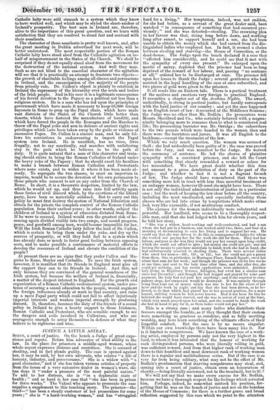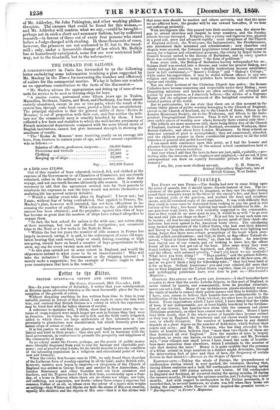Catholie lattfleere still staunch to a system which they know
hard for a living." Her temptation, indeed, was not sudden, to have worked well, and which may be styled the sheet-anchor of for she had before, as a servant of the great dealer sad, been Ireland's prosperity. The best men in Ireland are, therefore, watohed in consequence of something that had occurred pre- alive to the importance of this great question, and we learn with viously ; " and she was detected—stealing. The crowning plea satisfaction that they are resolved to stand fast and contend with in her favour was that, rising long before dawn, and working
their assailants. long after sunset, to support herself and a son she had been The character of those assailants is pretty well known, and, after unable to obtain the money which she had earned from the dis- the great meeting in Dublin advertised for next week, will be tinguished ladies who employed her. In fact, it seemed a choice better understood. The most respectable portion of the Roman between stealing and starving—the House of Correction, or the Catholic laity have stood aloof from the Cullenite agitation on be- dead-house. The Judge upon the bench declared it a case that half of misgovernment in the States of the Church. We shall be " affected him considerably, and he could see that it met with surprised if they do not equally stand aloof from the movement for the sympathy of every one present." He enlarged upon the the destruction of the national system. And well they may. merits of mercy, deplored that the prisoner had been so long Such as are not blind to the essential character of the agitation deprived of the reward of her labour, and, passing " no sentence will see that it is practically an attempt to frustrate two objects— at all," ordered her to be discharged at once. The prisoner fell the growth of charitable feelings among all classes and persuasions upon her knees to thank the Judge ; several gentlemen who had in Ireland, and the emancipation of the majority of the people assisted in the legal handling of the case at once subscribed, and from priestly rule. Dr. Cullen's object is plainly to establish in two pieces of gold were given to the prisoner. Ireland the supremacy of the hierarchy over the souls and bodies It all reads like an Eastern tale. There is a poetical treatment of the Irish people. And in his case it is a legitimate consequence of the motives and emotions very foreign to practical England. of his fervid devotion to the Papacy as a political not less than a It resembles a chapter out of the Arabian Nights. The award, religious system. He is a man who has fed upon the principles of undoubtedly, is strong in poetical justice, but hardly corresponds government which have made it necessary to keep10,000 foreign with the hard justice of our country ; and yet the case happened bayonets in Rome to prop up the Papal chair, which have made in an English court of law : it occurred at the Middlesex Sessions ; vast districts of the States of the Church little better than the Judge was no other than Mr. Bodkin ; the prosecutors were deserts, which have fostered the manufacture of banditti, and Messrs. Shoolbred and Co., who certainly behaved with a magna- which have forced the people in the Romagna and the Marches to nimity belonging more to romance than to what is considered real throw off the Papal yoke and arm in defence of ancient rights and life ; the prosecuting barrister was Mr. Orridge ; the subscribers privileges which have been taken away by the guile or violence of to the two pounds which were handed to the woman then and successive Popes. Dr. Cullen is a sincere man, and he only fol- there were the barristers and jurors. It was all English to the lows his convictions in endeavouring to import the Papal backbone,—except the treatment of the law.
system into Ireland. He is unselfish, has no vices lives Which we very much question. The woman was accused of frugally, not to say ascetically, and marches with unfaltering theft ; she had undoubtedly been guilty of it ; the case was proved step in the path -which he believes to be the path of before the Jury, and was manifest to the Judge. He waived duty. It is quite natural that a man of this character and train- the ceremony of sentence. He led the chorus of plaintive ing should strive to bring the Roman Catholics of Ireland under sympathy with a convicted prisoner' and she left the Court the heavy yoke of the Papacy ; that he should exert his faculties with something that closely resembled a reward or solace for to make a breach between Roman Catholics and Protestants her misconduct. We have great doubt whether this does where none exists, and to widen it where it has been made al- not amount to a gross dereliction of duty on the part of the ready. To segregate the two classes, to erect an imperium in Judge ; and whether in fact it is not a flagrant breach imperio, would be to secure the devotion of his own persuasion to of law. The Judge should have remembered that there was those priests who consent to act on any order from the Church of something more left in trust with him than merciful treatment of Rome. In short, it is a theocratic despotism, limited by the law, an unhappy woman, however ill-used she might have been. There which he would set up, and thus raise into full activity again is not only the individual administration of justice in a particular those furies of civil discord which, by the exertions of the liberal ease' but the work of keeping the law clear before all the country, party, have been so materially subdued. But to carry out this including the most uneducated, and especially including those policy he must first destroy the system of National Education and classes who are led into crime by temptations which make crime obtain for the priests the complete control of the Roman Catholic look very like excusable, if not meritorious conduct.
population from their earliest years ; in other words, subject the The excuses for the woman individually were substantial and children of Ireland to a system of education dictated from Rome. powerful. Her landlord, who seems to be a thoroughly respect- If he were to succeed, Ireland would run the greatest risk of be- able man, said that she had lodged with him for eleven years, and coming again divided visibly into two camps, and sound progress, he told her story.
peace, and goodwill among men, would become impossible for her. "She was a widow, hard-working and well-conducted, and had a son Will the Irish Roman Catholic laity follow the lead of Dr. Cullen, whom she had put to a business, and worked until two, three and four of a morning at dressmaking to earn her living and to support son. He which is certain to bring them under the yoke, and dry up the could say that she was driven to do this in consequence of ladies for whom sources of prosperity, or will they hold fast to a system which she worked not paying her for the work she did for them. They had her has already done so much to foster good feeling between opposing labour, and poor as she was they :would not pay her except upon long credit, sects, and to make possible a continuance of material efforts to which she could not afford to give but money she could not get; and not develop the resources of Ireland and elevate the condition of the having the means to purchase materials to finish work she had in hand, she people ? had unfortunately resorted to stealing them. There were several ladies who owed her money-10/., 11/., or 121., but she could not get a penny At present there are no signs that they prefer Cullen and Ma- from them. One in particular, in Montague Place, Russell Square, owed her guire to Kane, Ifeyler and Corballis. To save the Irish system, about that sum for her work ; and though the prisoner was ill for five weeks however, it is manifest that its friends in England must give all at One time, and sent to the lady time after time, and day after day, she the support they can to its friends in Ireland. And this, not could get nothing, and her recent applications were unheeded. Another
lady living in Highbury Terrace, Islington, had owed her a similar sum since last December ; and though she had begged and prayed for some part honest, striving woman he had never known. Had it not been for this he
Within our own knowledge there have been many like it. Nor of Mr. Adderley, Sir John Pakington, and other working philan- thropists. The excuses that could be found for this woman,— and Mr. Adderley will confirm what we say,—could be brought— perhaps not in such a short and summary fashion, but by sufficient research—in favour of three out of every four persons who stand before a Judge charged. with stealing. In those thousands of cases, however, the prisoners are not sentenced to 2/. but to the tread- mill ; only, under a favourable change of law which Mr. Bodkin has so hazardously anticipated, some few are now sentenced half- way, not to the treadmill, but to the reformatory.



























 Previous page
Previous page